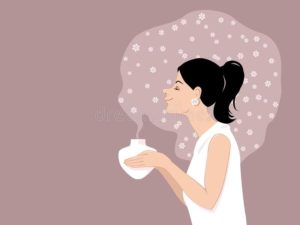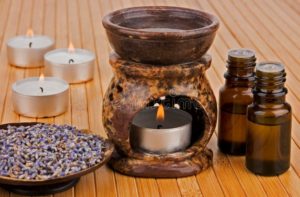Aromatherapy & The Scents of Relaxation
By Cindy Roe and Marie-Lise Baroutjian
NY Project Hope is a crisis counseling program that provides support and resources to help people cope with the challenges of the Covid-19 pandemic.
aro·ma·ther·a·py (n.) the therapeutic use of plant-derived, aromatic essential oils to promote physical and psychological well-being.
 In a previous post, we discussed the role our senses play in reducing stress. Our senses can be thought of as the points of entry where information about the outside world enters our conscious awareness, with our bodies and minds continually taking in what we see, hear, feel, taste, and smell, so we can respond to what’s happening in our environment. The sensory input of what we’ve seen and heard about the pandemic from news sources and social media alone- daily tallies of hospitalizations and deaths; changes to social distancing and mask wearing rules; concerns over the efficacy of the vaccines against new strains of the virus; and the safe reopening of schools in the fall- seemed to reinforce the stress and anxiety that many people had been struggling with since Covid-19 was first detected in late 2019. But while higher stress levels these days are certainly normal, recovering from the pandemic and its inherent stress is equally normal. And, importantly, it’s our senses-particularly our sense of smell-which can also play a big role in mitigating our stress. Thanks to the close linkage between the parts of the brain that control our emotions and our sense of smell, aromatherapy has earned its credence as an effective tool in the management of stress and anxiety.
In a previous post, we discussed the role our senses play in reducing stress. Our senses can be thought of as the points of entry where information about the outside world enters our conscious awareness, with our bodies and minds continually taking in what we see, hear, feel, taste, and smell, so we can respond to what’s happening in our environment. The sensory input of what we’ve seen and heard about the pandemic from news sources and social media alone- daily tallies of hospitalizations and deaths; changes to social distancing and mask wearing rules; concerns over the efficacy of the vaccines against new strains of the virus; and the safe reopening of schools in the fall- seemed to reinforce the stress and anxiety that many people had been struggling with since Covid-19 was first detected in late 2019. But while higher stress levels these days are certainly normal, recovering from the pandemic and its inherent stress is equally normal. And, importantly, it’s our senses-particularly our sense of smell-which can also play a big role in mitigating our stress. Thanks to the close linkage between the parts of the brain that control our emotions and our sense of smell, aromatherapy has earned its credence as an effective tool in the management of stress and anxiety.
Short List of Essential Oils courtesy of Geya Royals.com; NaturalFoodSeries.com; Alternative Medicine Zone
Drawing on a suggestion from aromatherapy experts, we’ve organized this list of calming essential oils based on their general qualities and noted the aroma type (floral, citrus, herbal, spicy, woodsy) in each description as well, which can be helpful when it comes to creating blends of oils that work together synergistically to achieve a specific result.
Bergamot– (citrus) culled from the rind of un-ripened blood oranges, this oil has a pleasing aroma that brings about a state of calm, which some sources say is the result of its ability to balance the hypothalamus.
Clary Sage-(herbal) Not to be confused with the sage discussed above, clary sage is effective at easing stress and anxiety.
Eucalyptus– (herbal) clears the mind; inhibits viruses.
Geranium (floral) soothing and calming, it’s also effective for reducing acne, thanks to its astringent qualities. Also effective at repelling insects, it mixes well with other essential oils, particularly those in the citrus, floral, and woodsy aroma types.
Jasmine– (floral) this essential oil is effective at easing stress and anxiety, and is water-friendly, making it a good option for diffusers and sprays.
Lavender – (floral) cleansing, calming. Used in facial and body products.
Neroli-(floral) derived from orange blossoms, the scent is fresh and green, making it a great choice for relaxation.
Peppermint – (herbal) calming, lifts one’s spirits; also helpful with breathing difficulties, chest or head congestion, particularly when placed in a diffuser.
Rosemary- (herbal) effective at lowering the level of the stress hormone cortisol in the body, rosemary oil is a skin-friendly option for your stress reduction. A word of caution though; rosemary oil doesn’t always mix well with other oils, so be sure to search out some recipes and mixing methods first.
Sandalwood-(woodsy) sweet and woodsy scented sandalwood is also favored for its anxiety reducing and sleep-improving qualities.
Sage-(herbal) not just for adding to your holiday turkey and stuffing, sage is a natural deodorizer, insect repellant, and has antiseptic and astringent qualities; thus, it’s widely used in skincare products. Plus, it’s pleasant scent aids in relaxation, and it mixes well with other aromatic oils.
Vanilla-(floral) Antioxidant properties make vanilla a good choice for inclusion in skin care products, since it’s antioxidants that help offset the free radicals that are damaging to the skin. Also, vanilla is well known as a mood booster, helps lower blood pressure and is effective in inducing sleep.
Tips for Buying and Using Essential Oils information courtesy of Alternative Medicine Zone and essentialoilhaven.com
Start off by searching out a recipe or two that you want to try that uses only a few ingredients. This can give you practice at measuring out the right number of drops of the essential oils you’re using (since they’re often measured by the drop) and at perfecting your mixing techniques.
Do Your Research! Some oils have safety warnings that should definitely be heeded! Don’t assume that any oil is safe for everyone just because it’s a natural product; pregnancy, asthma, epilepsy, certain heart conditions, children, the elderly, and pets are just some of the populations and conditions that can be adversely affected by certain essential oils. Same goes for certain oils, such as clove, that should NEVER be used on the skin at all.
ALWAYS dilute an essential oil before using, and again, read up on recommendations for pairing essential oils and bases and method(s) of use, like diffusers. Because essential oils are concentrated, they must NEVER be applied to the body in an undiluted state. Also, be mindful that sensitivity to any oil can still occur, so be sure to test them out on a small area first; if any redness, itching, swelling, or rash occurs, discontinue use. Lastly, be mindful too that some oils react when they’re exposed to sunlight-all the more reason to learn about the oils you want to use beforehand.
Carrier or base oils, which are basically the oils that are derived from the fatty portion of a given plant through pressing, are used to dilute essential oils so they can be used topically on the skin. Commonly used oils include almond, jojoba, apricot kernel, avocado, coconut, grapeseed, and hemp seed. A general rule of thumb for diluting essential oils is to mix 12 drops of an essential oil to 1 ounce of carrier oil. And remember the mantra less is more; you can always add an extra drop after diluting an essential oil as directed, but trying to add more carrier oil to lessen the intensity of a scent can be a costly mistake that can lead to disappointing results and a lot of wasted oils. Bear in mind too that some essential oils can be diluted with water; as noted earlier, doing your homework on the oils you want to use is a must.
Think Quality-products that state the botanical name of the oil, the method of extraction, and the country of origin tend to be of higher quality.
- Packaging-look for oils that come in dark brown glass bottles, preferably with droppers. Pure extract oils can deteriorate quickly when exposed to light, hence the dark colored bottle. Storage tip: keep your oils somewhere where the bottles can remain upright and not be exposed to a lot of light.
- Look for concentration-some products out there have been literally watered down, and while that might be fine for use in a diffuser, if you’re making a body scrub or lotion, they might not mix correctly with other ingredients or give you the desired fragrance intensity you’re expecting. So be sure to read labels first.
- Another word about labels-terms like “nature identical”, “artificial”, “perfume” likely indicate that the product is not a true essential oil.
- Just because they’re all oils doesn’t mean they will pair well with other oils-sorting your oils into groupings based on the oils’ general properties, which can help you design blends that will achieve a specific desired effect, or by scent families, such as floral, woodsy, etc., is a helpful place to start.
Ways to Use Essential Oils
 You can buy scented candles and incense that have been made with essential oils, which is a no muss, no fuss way of adding aromas into your living space. One downside here- getting used to the smoke from incense can take some time. For this reason, some people prefer candles.
You can buy scented candles and incense that have been made with essential oils, which is a no muss, no fuss way of adding aromas into your living space. One downside here- getting used to the smoke from incense can take some time. For this reason, some people prefer candles.
Diffusers come in all different types, sizes, and price ranges. On the lower end of the price point range you’ll find lightbulb rings; a few drops of essential oil are added to the ring, which is placed on top of a lamp’s lightbulb. When the lamp is turned on, the heat from the lightbulb emits the aroma. Similar to wax melt burners, candle diffusers have a small well on top for water, and a center area where a tealight candle is placed. Add water to the well plus a few drops of oil, light the tealight, and enjoy the fragrance. Plug in diffusers offer with and without-water options, and work similar to candle diffusers, without a flame.
Direct application of essential oils can be done by making or purchasing body products or room sprays. See below for a 5 ingredient Lavender Vanilla Sugar Scrub recipe that’s super easy and fun to make.
Lavender Vanilla Sugar Scrub-adapted courtesy of suburbansimplicity.com
1 cup sugar (white or brown sugar- preferably organic)
1/2 cup oil coconut oil
1/4 cup almond oil
½ tsp Vitamin E oil (or substitute ½ tsp almond oil since you already have it 😊)
1/2 tsp real vanilla extract
15 drops lavender essential oil
- Place all ingredients in a bowl and mix thoroughly.
- You can add more or less oil to your liking-also you can try adding in some food grade dried lavender to make it extra pretty (Amazon carries it)
- Store in an airtight container. Since this recipe doesn’t contain any chemical preservatives, it’s best to use it within a month or two.
- Feel free to swap out the lavender and vanilla with other essential oils
Other Ways NY Project Hope Can Help
While these tips can be helpful in managing stress, it’s also important to remember that, particularly now- given the ways that the Covid-19 pandemic has changed so much about daily life- feeling stressed out is a normal and completely common reaction. Asking for help if you’re feeling overwhelmed is always okay, whether from a family member, friend, or spiritual advisor, and the Crisis Counselors for NY Project Hope at Independent Living are always available to help, since sometimes it can be helpful to talk to someone you don’t know. Want to know more about how we can help? Give us a call at 845-762-2275-talking to us is always free, voluntary, and confidential.
Visit Independent Living Inc on Facebook, Instagram, or on the web at www.myindependentliving.org for more blogs, tips and videos on stress management techniques and coping strategies. #iliprojecthope.
Cindy Roe and Marie-Lise Baroutjian are crisis counselors from Independent Living, Inc. working on with the NY Project Hope program.

